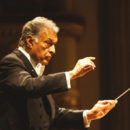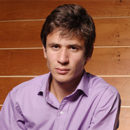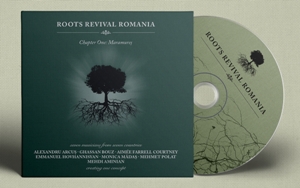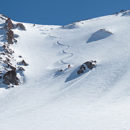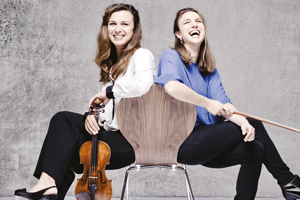
Sarah Nemtanu – “Playing in an orchestra is my passion”
Born in France of Romanian parents and having studied at the Conservatoire de Paris, Sarah Nemtanuhas been sharing the position of first violinist at the French National Orchestra with Luc Héry, since 2002. She feels “entirely Romanian” and, in 2009, she intrepreted Tchaikovsky’s Violin Concerto in Dmajor in the film The Concert, by Romanian director Radu Mihăileanu.
You first studied with your father and afterwards with Gérard Poulet. Each one of them belongs to a different school.
Right from the beginning of my education I was in contact with a triple culture. At first, it was the advice of my father, who studied with Ștefan Gheorghiu, a former disciple of Oistrah, and the Eastern rigor, that is obvious in the right hand`s technique; also in the scales it is very important. Then, I met Gérard Poulet, from who I have learned this a la francaise sound, a very particular esthetics. Gérard Poulet`s father, Gaston Poulet, has played, as a first international audition, the Sonata for violin and piano by Debussy, with Debussy playing the piano; this tradition that my teacher was familiar with, represented a big opportunity for me and my sister. Third, I had encountered an incredible personality at the Music Conservatory, my chamber music professor, Pierre-Laurent Aimard, a student of Alfred Brendel, a fanatic with an amazing knowledge of the romantic and German music in general. I consider him to be a visionary musician. This triple culture – French, Romanian and German – had a deciding influence on me.
You were born in France, but your parents are originally from Romania. Do you feel a bit Romanian?
I don`t just feel a bit Romanian, I feel entirely Romanian. In my soul feel completely Romanian, but I feel French in terms of education and my way of thinking. In my artist soul, I feel, I know that my roots represent an opportunity for me. If our blood were to write the name of the country we come from when we bleed, my blood would certainly write Romania. My father is from Bucharest, but my grandfather was born in Piatra Neamț, and his great-grandfather came from Ukraine and relocated in Piatra Neamț, and this is why he got the name Nemțanu. When I was a child, we would celebrate Jewish Easter at home with my father`s family and the orthodox Easter with my mother`s family.
How did you choose the works for Gypsic, where you play Balkan music?
When I recorded Gypsic, my first disc, I searched for some time how to name it, I wanted a neologism, I wanted the name of a community. At first, I indented to name it Lăutari, but I chose a name that did not exist. The aim was to revisit three classics (the sonata number three by Enescu, a piece of Ravel`s sonata and Berceuse by Fauré) and to play three works with fiddler influences (Fiddler songs by Sarasate, Tzigane by Ravel and Monti`s csárdás). In Monti`s piece, Czardas, I did not want to emphasize the easy part, that is playing fast, hard and in a virtuoso manner. I especially wanted a not so hurried up approach, with a more lento tempo, to make the harmonies of this piece heard out. I have been told several times that I have quite a masculine sound, issued by my wrist, by the strength of my hand and I believe this is something that comes from the folklore. The instrumental folklore is very masculine, it is transmitted from father to son. My way of playing is not a la francaise, fine, refined (only when I have to), and what I care about is o be as good as possible playing that style: when I play Brahms or Mozart, I try to get as close as possible to their style.
How did you become a first violin at the French National Orchestra?
My father was the first violin of the Bordeaux Orchestra, so when I was a child I would always go to practice in a studio where he was rehearsing, a studio located right near the grand rehearsal hall so I was always among orchestra musicians. It seemed incredible. The orchestra was like a village: the mayor was the conductor, his second was the first violin and each inhabitant had his role, his responsibility in the well being of the orchestra. This was fascinating for me. I love being a soloist, but this is not what I prefer. I like better to see music through a community, and the repertoire is huge. After playing the integral of Beethoven`s symphonies and you want to play the sonatas for violin and piano, the vision is completely changed. I was 20 years old when I saw the O.N.F. contest and I went, although my father did not encourage this decision, telling me I am too young for it. I was lucky. There were 40 candidates, but Kurt Masur, who had just signed the contract with the orchestra, liked me and gave me this opportunity. Playing in an orchestra is my passion.
You have recently recorded a CD where you play concerts for violin by Bach together with Deborah Nemtanu, your sister. What is the history of this disc?
We were lucky that we are sisters and to have the opportunity of growing together with the violin. No one, even someone who works ten hours per day, is able to know the alchemy that exists between two sisters who play together since forever. Each of us has her own personality, her particular way of playing, but when we play together there is a perfect chemistry between us, when we listen afterwards, we don`t really know who is playing what part. I swear. There is just a two years difference between us. We have the same musical route, same professor, we play the same instrument, so we are almost like twin sisters, right? This Double by Bach, was a lullaby during our childhood and the first musical memory we have together. Learning how to listen to one other from the age of five is very fulfilling. Then, I have also chose Concerto grosso No. 3 by Schnittke, because this piece has Bach`s ghost in it. Schnittke uses many quotes from Bach, but he transforms them and you get the impression they are somehow tortured.
How do you imagine your career if there weren`t for the film The Concert by Radu Mihăileanu?
My fame and 80% of the concerts I play today are thanks to this movie and I am proud of this and I am grateful to Radu Mihăileanu and to Armand Amar, the composer of the film`s music, who presented me to Radu. It doesn`t bother me that The Concert is very much talked about, I am not at least bothered to play Ceaikovski`s concert a thousand times. The film had two million spectators in France and the next year I received a thousand emails from all over the world, from people who had seen my name on the credit slide at the end of the movie.
Who are the musicians that you listen to and for which you have a particular respect?
Radu Lupu – for his sound and for the fact that he doesn`t fall into any category. He is out of the ordinary. He succeeds in taking us into a different world from the very first notes. When I was a student, I would listen over and over again to Chopin`s ballads with Murray Perahia. Perahia is not at least interested in making a name for himself, he lives isolated somewhere in the country side I believe. Then, I absolutely love Grigory Sokolov and Vladimir Horowitz. Another shock was the recording of the violin concert by Tchaikovsky with David Oistrakh. For me, the great people are the ones who know how to innovate.
What about a conductor that you admire?
Andris Nelsons. He has a double vision: the vision of clarity and the vision of the piece that he conducts. He is one of the greatest; music goes through his mind and his soul very freely. He just serves music and he has an enormous gentleness. You must have an ego if you are a musician, but you also need to moderate it.


